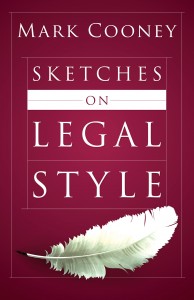Are the legal-writing classes you had in law school the last writing training you’ll need for your career?
If you’re a bankruptcy lawyer, was a law-school class the last bankruptcy training you’ll need?
That’s your answer. Legal writing is like any skill or substantive topic: there’s always more to learn, and there’s always room for improvement. But sometimes, busy legal writers rest on plateaus. We produce good-enough legal writing, and we’re comfortable on that plateau, so we stay. Here’s some advice for moving on.
1. Admit you have room to improve. When I was a full-time lawyer, I thought I was a good writer, above average. Now I realize I hadn’t been that good. I’d been quite mediocre. I was poorly educated about the standards of high-level professional writing, and I was ignorant of my own limitations. Was I unique? Probably not. Many lawyers believe themselves to be good writers, above average within the profession, but I say this: The first step to becoming a good legal writer is to admit you have room to improve.
2. Get some references. Once you’ve admitted you have room to improve your writing—that you’re resting on a plateau—start learning. A great way to raise your writing IQ is to consult the experts. When you have a question about writing, don’t rely on half-remembered “rules” from high-school English. Look it up. But where? Here are two websites I like:
But if you’re serious about legal writing, you’ll need some reference books, and here are three I recommend:
- The Redbook, by Garner
- The Texas Law Review Manual on Usage and Style
- Just Writing: Grammar, Punctuation, and Style for the Legal Writer, by Enquist & Oates
Your goal is to have reliable references handy to answer questions. Other professional writers consult writing references, and lawyers should, too.
3. Read writing books. If you’re serious about getting off that plateau, you’ll have to do more than consult references. You’ll have to study the principles of good writing and good legal writing. But how, when you’re busy? Set a goal to read one book on writing every year. Here are some I like
- Lifting the Fog of Legalese, by Kimble
- The Lawyer’s Guide to Writing Well, by Goldstein & Lieberman
- Writing with Style, by Trimble.
These books are great sources of writing knowledge, and they’re also well written. Reading the best books teaches you writing and exposes you to good writing.
4. Practice what you learn. You’re reading about writing and you’re consulting writing references. Now practice what you’re learning. Of course, for any working lawyer, writing practice is part of the job: you’re writing all the time. Yet we tend to rest on plateaus—we write as we always have, with the same habits, the same limitations. (That’s why studying writing is so important. Practice without study is usually just repetition.) So experiment with things you’re learning. Try new techniques and master new approaches to writing.
5. Edit better. We all know editing is crucial to good writing. Most of us can’t produce high-quality writing in one draft (or even two). We must edit, so here are some suggestions for getting off the editing plateau.
Leave plenty of time, even though it’s hard to do. How much? One pro recommends half the time on a writing project. Debra Hart May, Proofreading Plain and Simple 46 (1997).
Use more than one technique when editing: Do you edit on the computer screen? That’s fine, but it’s not enough. Do some editing on a hard copy, too; we read and react differently to screen text and printed text. Do you read the text out loud? That’s great: you’re using your ears, not just your eyes, to help you edit. Now go further and have a trusted colleague read it and suggest some edits. Do you read the document in reverse, from the last sentence to the first? Good. This technique tricks your mind, so you’re not familiar with the text; familiarity leads to poor editing. Now read only the topic sentences. Next read the opening and closing paragraphs.
Mediocre writing becomes good writing only through editing.
6. Accept critique. Here’s the hardest part: seek and welcome critiques and candid suggestions for improving your writing. This one’s tough because it’s natural to be defensive about your writing—maybe even insecure. I know I am. But when I avoid critique, I don’t improve much. I rest on a plateau. So open yourself to honest critique. Find a trusted colleague, friend, or supervisor, someone whose judgment and writing you respect. Then ask for suggestions, and take them to heart. The best writers are open to critique.
Now move off that plateau.
_____
If you’d like to comment on this or any post, please email me. I’ve had to disable comments because of excessive spam. Sorry.
